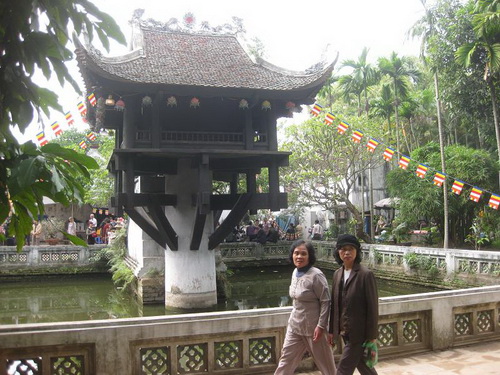Following the ‘ultimatum’ filed by head of Hanoi’s hallmark Mot Cot (One-Pillar) pagoda, in which he said he will carry out the renovations if his petition goes unheeded again, a meeting was held on May 15 to discuss the project to revamp the pagoda.
At the meeting, joined by officials from the Ba Dinh district, Hanoi Department of Culture, Sports and Tourism, Venerable Thich Tam Kien, the pagoda head, and experts, the pagoda conditions were brought up, including the expansion incongruous with its panorama, seriously inadequate sewage systems and prevalent roof leaking.
Venerable Kien lamented that the pagoda, which is believed to be built back in 1049, suffers flooding only after a one-hour rain. Its Buddha statues even have to wear raincoats and hats but raindrops still seep in, taking their toll on them.
Truong Minh Tien, deputy head of the city’s culture department, said the revamp project will be finalized by June 30 to shield the pagoda from summer rains.
Meanwhile, temporary repairs will be made to seriously leaked roofs to protect the statues and other properties from harm.
However, the officials rejected Venerable Kien’s petition on the construction of two more compartments for worshiping the pagoda’s founders and as new shelter for its monks considering the pagoda’s limited living space for both its monks and visitors.
The One Pillar Pagoda, formally known as Dien Huu or Lien Hoa pagoda is a historic Buddhist temple in Hanoi and is considered one of Vietnam's few iconic pagodas.
Upon monk Thien Tue’s counseling, King Ly Thai Tong, who ruled from 1028 to 1054, constructed the pagoda in 1049 to express his gratitude to Bodhisattva Avalokiteshvara, who he met in a dream and believed gave him his son.
The pagoda was modeled after a blooming lotus with a pillar erected amidst a lotus pond, just like the lotus the Bodhisattva was seated on in the dream.
The pagoda, built of wood on a single stone pillar of 1.25 m in diameter, was renovated by King Ly Nhan Tong in 1105.
In 1954, the French Union forces destroyed the pagoda before retreating. The pagoda was rebuilt afterwards.
The Mot Cot pagoda was recognized as “The unique architecture in Asia” by the Asian Record Organisation in late 2012, Vietnam's first Asian record in religious architecture.
A replica of the pagoda was built in Ho Chi Minh City’s Thu Duc district in late 1950s.



















































